Obama has once again taken our Congressional dunces to the woodshed. He is rushing the Iranian Nuclear agreement (or what we like to call, The Iranian Nuclear Guarantee) to the UN. It will be debated and approved by the Security Council within days and at that point it will force the US to comply.
If the Senate votes to disapprove, it will be meaningless as we are bound by the UN Security Council. The US must comply.
And to make matters worse, the document requires the US to provide "security" for the nuclear installations and to teach the Iranians how to prevent sabotage. This was reported last night on the Mark Levin show.
So what happens if and when Israel bombs the plant? Does it mean that the US would have to attack Israel? Unfortunately, that could be the result.
So now we are defending the people who will be nuclearizing the Middle East while they go merrily on their way. Seems like we have given away the horse even before it was out of the barn. Some negotiators we have.
Conservative Tom
The Latest: Clinton approves Iran deal; US to present to UN
WASHINGTON (AP) — Here are the latest developments involving an agreement between Iran and world powers in Vienna over the Islamic Republic's nuclear program (all times EDT):
9:45 p.m.
Former Secretary of State Hillary Rodham Clinton says she supports the deal six major powers reached with Iran to rein in its nuclear program.
The Democratic presidential candidate says the agreement is "the culmination of a sustained strategy of pressure and engagement executed over many years," including her time as the top U.S. diplomat.
Clinton says the U.S. has to be "clear-eyed" about "the broader threat Iran represents." And she says opponents of the deal "are right to call for extreme vigilance."
Still, Clinton argues that "this agreement can make the United States, Israel and our Arab partners safer."
___
9:15 p.m.
A U.N. Security Council diplomat says the United States will circulate a draft resolution Wednesday that will authorize the Iran deal.
The diplomat, speaking on condition of anonymity because talks were private, said the U.S. informed council members Tuesday evening that it would introduce the resolution at the end of closed consultations on Libya scheduled for Wednesday morning.
The diplomat tells The Associated Press' Edith M. Lederer that U.S. Ambassador Samantha Power will outline the main points in the agreement to council members.
___
6 p.m.
President Barack Obama will have more to say about the Iran deal on Wednesday.
The White House says Obama will hold a news conference at the White House to continue selling the agreement that he contends will cut off all the pathways Iran currently has to develop a nuclear weapon.
Many Republicans and some Democratic lawmakers, and leaders such as Israeli Prime Minister Benjamin Netanyahu, disagree with Obama's assessment of the deal.
Most Republican presidential candidates also object to the accord.
Obama plans to take questions before departing on a two-day trip to Oklahoma.
___
5:45 p.m.
President Barack Obama has been discussing the Iran deal with various allies in the Middle East.
The White House says Obama telephoned Saudi's King Salman on Tuesday while he was on his way to Philadelphia to give a speech.
Obama also reached out to Crown Prince Mohammed Al Nahyan of the United Arab Emirates.
The White House says Obama recalled a summit earlier this year with Persian Gulf nations and reiterated that the U.S. remains committed to working with them to counter Iran's destabilizing activities in the region.
___
5:30 p.m.
Oil prices that slumped steeply earlier this year may take another hit once the nuclear deal between world powers and Iran lets that country start pouring more crude into a market already brimming with supply.
Many analysts estimate that Iran, which is OPEC's fourth-largest oil producer, has piled up tens of millions of barrels on floating barges that can be exported in fairly short order after sanctions have been lifted. The country will follow that with increased production from its oil fields.
When all this happens and how it will affect the price of oil remains far from certain. Energy prices can depend on production levels in other countries, currency rates and demand sparked by the health of global economies. Plus there are questions about the state of Iran's oil infrastructure and its ability to increase production.
Despite all the uncertainty, analyst Tom Kloza expects the lifting of sanctions to help make energy prices next year "more palatable for most of the world."
___
4:45 p.m.
Saudi Arabia's state news agency says the kingdom has warned Iran not to use money that will follow from the lifting of sanctions to incite turmoil in the region.
The Saudi Press Agency says Tehran must use the funds in the service of the Iranian people.
The statement cites an unidentified Saudi official as per the kingdom's regulations. It comes after Iran concluded a deal earlier Tuesday in Vienna with six world powers.
The statement says the kingdom has always stressed the importance of reaching a deal that would prevent Iran from acquiring a nuclear weapon and contain mechanisms for permanent inspections of nuclear sites and for re-imposition of sanctions if Iran violates the terms.
___
3:40 p.m.
The U.S. ambassador to the United Nations says the United States will submit a draft resolution to the Security Council "in the coming days" to endorse the Iran nuclear deal and take other important steps.
Samantha Power says these steps include replacing existing Security Council sanctions resolutions with the new restrictions agreed on in the talks. She's hoping for "timely adoption" of the resolution.
An annex to the agreement on Security Council actions states that provisions on Iran sanctions in seven resolutions dating back to 2006 will be terminated by the deal but subject to re-imposition if Iran doesn't live up to the terms in significant ways.
The resolution is almost certain to be approved because the deal with Iran involves the five veto-wielding Security Council members — the U.S., Russia, China, Britain and France — and they have agreed on the text of the draft.
___
3:30 p.m.
The wife of an Idaho pastor held prisoner in Iran says she's deeply disappointed that the U.S. agreed to a nuclear deal with the Mideast nation without first getting her husband released.
Naghmeh Abedini says she met President Barack Obama in January while he was visiting Boise and urged him not to approve the deal without working on securing her husband's freedom.
Abedini, who lives in Boise with their two children, now says she's focused on pressing Congress to review the deal with her family in mind.
Christian pastor Saeed Abedini, who's 34, has been in Iranian custody since September 2012. He was sentenced to eight years for what was termed undermining state security when he attempted to build a church network in private homes. Abedini is of Iranian origin but had been living in Boise.
___
3:20 p.m.
The Iran nuclear deal sets up a campaign clash between Democratic presidential contender Hillary Rodham Clinton and Republicans vying for the White House.
Several leading Republican rivals stepped up Tuesday to denounce the agreement. Among them, Jeb Bush called it appeasement. Florida Sen. Marco Rubio and Wisconsin Gov. Scott Walker both said they'd rescind the deal if elected president.
Clinton, in contrast, has endorsed the agreement and said she'd be committed as president to seeing its terms honored.
Her position underscores the tangled links between President Barack Obama's foreign policy legacy and the presidential aspirations of his former secretary of state.
In the 2008 Democratic presidential contest, she called Obama's offer to meet Iran's leader without preconditions "irresponsible" and "naive."
But four years later, as secretary of state, Clinton helped begin the talks with Tehran, sending an adviser to secret meetings with the Iranians that led to the start of the international negotiations.
Now, Democrats in Congress who are skeptical of the nuclear agreement are looking to her for direction.
___
2:20 p.m.
Minutes after Iran and world powers announced their deal to curtail Iran's nuclear ambitions in exchange for an easing of economic sanctions, a text message began making the rounds on Iranian mobile phones.
It read: "Goodbye falafel. Hello McDonald's."
Another text joked that the country's ATMs would soon be dispensing U.S. dollars instead of Iranian rials.
There may not be a McDonald's yet, but ordinary Iranians have been quick to welcome the deal as a chance to end their nation's isolation and improve Iran's economy after years of stifling sanctions.
There were no signs of people pouring into the streets of Tehran after the deal was announced, but that may have more to do with the stifling summer heat and the fact that most Iranians are fasting during the last days of Ramadan.
Many instead were glued to television coverage of the deal, which included a rare live feed of President Barack Obama's address on state TV.
___
2 p.m.
Defense Secretary Ash Carter says the U.S. is prepared to bolster the security of allies in the Middle East, using military means if necessary, to check what he calls Iran's "malign influence" in the region.
His statement is intended to reassure allies nervous about the landmark deal reached with Iran to control its nuclear program. Israel is strongly opposed to it.
Carter says deterrence remains a major component of America's national security and the U.S. has tens of thousands of military personnel in the region to defend against any aggression, ensure freedom of navigation in the Gulf and make sure Iran's influence is restricted.
___
1:40 p.m.
President Barack Obama has told Israeli Prime Minister Benjamin Netanyahu that the Iran nuclear deal won't lessen U.S. concerns about Iran's support for terrorism and its threats toward Israel.
The White House says Obama spoke Tuesday with the Israeli leader and reiterated that the deal, in his view, will prevent Iran from becoming nuclear-armed, which is of interest to both the U.S. and Israel.
Obama said a planned visit to Israel next week by U.S. Defense Secretary Ash Carter is a reflection of the high level of security cooperation between the two allies.
Netanyahu on Tuesday blasted the deal as a "stunning historic mistake" and pointedly noted that his country is not bound by the agreement.
___
1:20 p.m.
President Barack Obama has thanked European leaders for their help in reaching the nuclear deal with Iran.
Obama discussed the historic agreement in separate conversations Tuesday with French President Francois Hollande, German Chancellor Angela Merkel, British Prime Minister David Cameron and the European Union's foreign policy chief, Federica Mogherini.
The three countries and the EU are part of the group that negotiated with Iran for nearly two years.
The White House says the leaders agreed the deal represents a historic solution that will verifiably cut off all the pathways Iran has to develop a nuclear weapon.
___
12:30 p.m.
World reaction to the Iran nuclear deal is pouring in.
German Chancellor Angela Merkel says the agreement provides a "realistic chance of overcoming one of the most difficult international conflicts through diplomatic means" and brings much closer the goal of preventing Iran from developing nuclear weapons. Germany is a party in the negotiations and its main business lobby is anticipating a surge in exports to Iran as economic sanctions lift.
Egypt's foreign ministry calls the deal an important development that could lead to regional stability and head off an arms race. Egypt and Iran have not had full diplomatic ties since 1979 when Iran had its Islamic revolution and Cairo signed a peace deal with Israel.
As well, the United Arab Emirates is welcoming the agreement. The seven-state federation has longstanding trade ties with Iran but, along with other Gulf Arab countries, has been deeply skeptical of Iran's ambitions in the region.
___
12:10 p.m.
At the United Nations, the Security Council is preparing a resolution to endorse the deal restricting Iran's nuclear development in exchange for the lifting of sanctions against Tehran.
French Ambassador Francois Delattre says the draft resolution will be presented to the council in coming days.
A senior Security Council diplomat says the U.S. took the lead in drafting the resolution. Asked whether it's likely to be approved within seven to 10 days, the diplomat says that's the "right ballpark."
The diplomat was not authorized to be identified and spoke on condition of anonymity.
___
11:50 a.m.
Republican presidential contender Jeb Bush calls the Iran nuclear deal "dangerous, deeply flawed and short sighted."
He says the agreement merely consolidates the grip on power of "violent revolutionary clerics who rule Tehran with an iron fist."
Bush says the agreement is not diplomacy, but "appeasement."
___
11:40 a.m.
Here's what's ahead for the Iran nuclear deal in Washington:
After receiving a copy of the agreement, lawmakers will have 60 days to read it, vote yes or no — or take no action.
They'll want to know: Does it call for inspections of Iranian nuclear and military sites anytime, anywhere? What sanctions against Iran will be lifted and when? Can sanctions be reinstated if Iran cheats? Did Iran come clean regarding its past nuclear activities? That's just for starters.
Congressional hearings could start soon but formal action appears unlikely before the August recess.
If Congress rejects the agreement, President Barack Obama is expected to veto that decision. A two-thirds majority in the House and Senate would be needed to override his veto.
Even if Congress votes against the deal, that doesn't scuttle it.
Congress can only thwart the deal by passing new sanctions legislation or stripping away Obama's authority to waive those sanctions that were imposed earlier by Congress.
Moreover, Obama could unilaterally offer a hefty portion of sanctions relief on his own. He can't lift the congressionally mandated sanctions, though. Only Congress can do that.
___
11:00 a.m.
Republican presidential contender Chris Christie hopes Congress will reject the Iran nuclear deal.
The New Jersey governor says the deal will lead to a nuclear Iran and Middle East, threatens Israel and the U.S., and "turns 70 years of nuclear policy on its head."
Earlier, Republican presidential rival Marco Rubio also turned thumbs down on the agreement, saying the U.S. gave "concession after concession to a regime that has American blood on its hands, holds Americans hostage, and has consistently violated every agreement it ever signed."
Christie says President Barack Obama's team should have walked away from the talks. Instead, says the governor, Obama is "playing a dangerous game with our national security."
___
10:30 a.m.
The family of retired FBI agent Robert Levinson, who is believed to be held hostage in Iran, is marking the historic nuclear deal by urging the Obama administration and Iran to continue to press for Levinson's release.
Levinson's wife, Christine, said leaders of the two countries "need to continue working together with the same sense of urgency to resolve Bob's case and return him home to his family as soon as possible."
Levinson has been held hostage for more than eight years, making him the longest-held American hostage in history. His wife said, "This nightmare must end."
An Associated Press investigation published in 2013 revealed that Levinson vanished while working for the CIA on an unapproved intelligence-gathering mission.
__
10:30 a.m.
Israel's prime minister says his country is not bound by the international nuclear agreement with Iran, and that Israel reserves the right to defend itself.
Benjamin Netanyahu says the world is now a "much more dangerous place" and criticized Tuesday's agreement as a "stunning historic mistake."
Speaking in English to reporters in Jerusalem, he said that by removing sanctions, the deal will give Iran billions of dollars to support what he calls a worldwide terrorism network.
He also says it "repeats the mistakes" of an earlier international agreement with North Korea, in which international inspections failed to prevent the country from developing a nuclear weapons capability.
___
9:55 a.m.
President Barack Obama is starting his campaign to sell the nuclear deal with Iran to skeptical U.S. allies and members of Congress.
Senior Obama administration officials say Obama informed the leaders of the House and Senate of the deal Monday night, and plans to speak with additional members of Congress this week.
Obama will also spend part of the week speaking with his foreign counterparts. Officials say Obama will talk to key European allies as well as Israeli Prime Minister Benjamin Netanyahu and Saudi Arabia's King Salman. The officials briefed reporters on condition of anonymity.
Netanyahu has been a chief critic of the negotiations and immediately rejected the deal. He's expected to work to persuade U.S. lawmakers to pass legislation that would block Obama from lifting sanctions on Iran.
__
9:45 a.m.
U.S. Sen. Marco Rubio, a Republican presidential candidate, is predicting that Congress will reject the nuclear agreement with Iran. Rubio says the deal "undermines our national security."
The Florida senator said President Barack Obama gave "concession after concession to a regime that has American blood on its hands, holds Americans hostage, and has consistently violated every agreement it ever signed."
Rubio says that failure to obtain congressional support would tell the Iranians and the world "that this is Barack Obama's deal, not an agreement with lasting support from the United States."
___
9:05 a.m.
Russian President Vladimir Putin says the deal with Iran has brought the world "a sigh of relief."
In a statement published on the Kremlin website, Putin also said that "Russia will do its utmost to make sure that the Vienna agreement is fully implemented, thus contributing to the international and regional security."



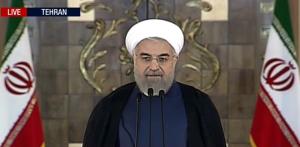
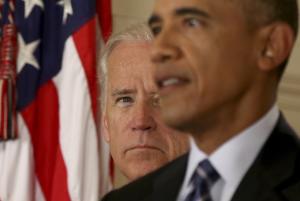
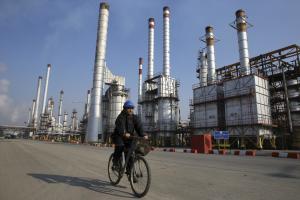
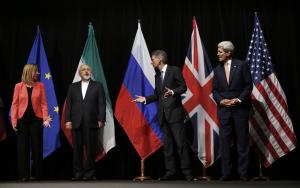
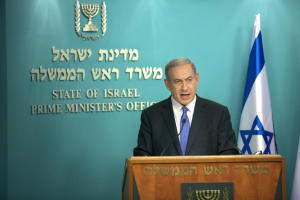
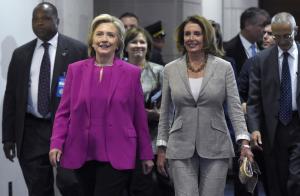
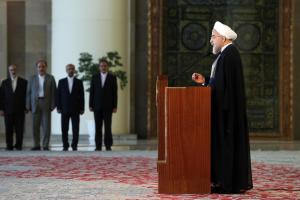
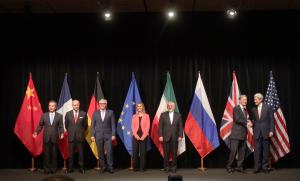
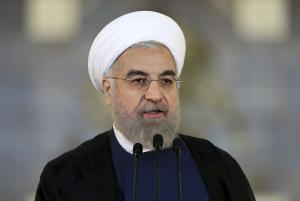
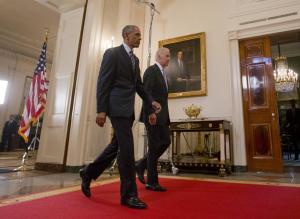
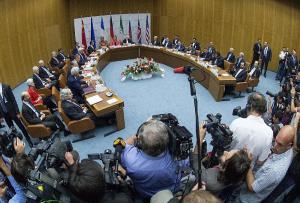
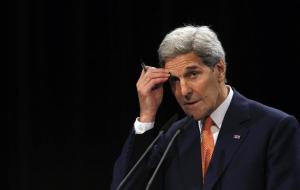
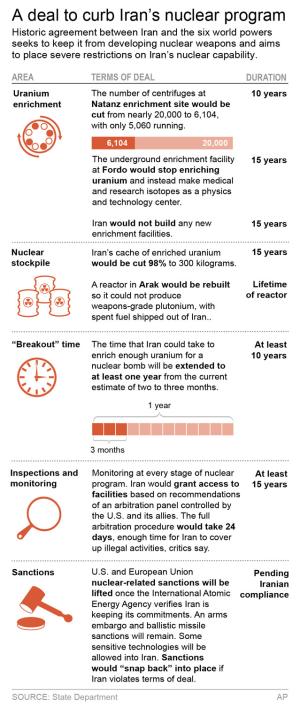
No comments:
Post a Comment
Thanks for commenting. Your comments are needed for helping to improve the discussion.